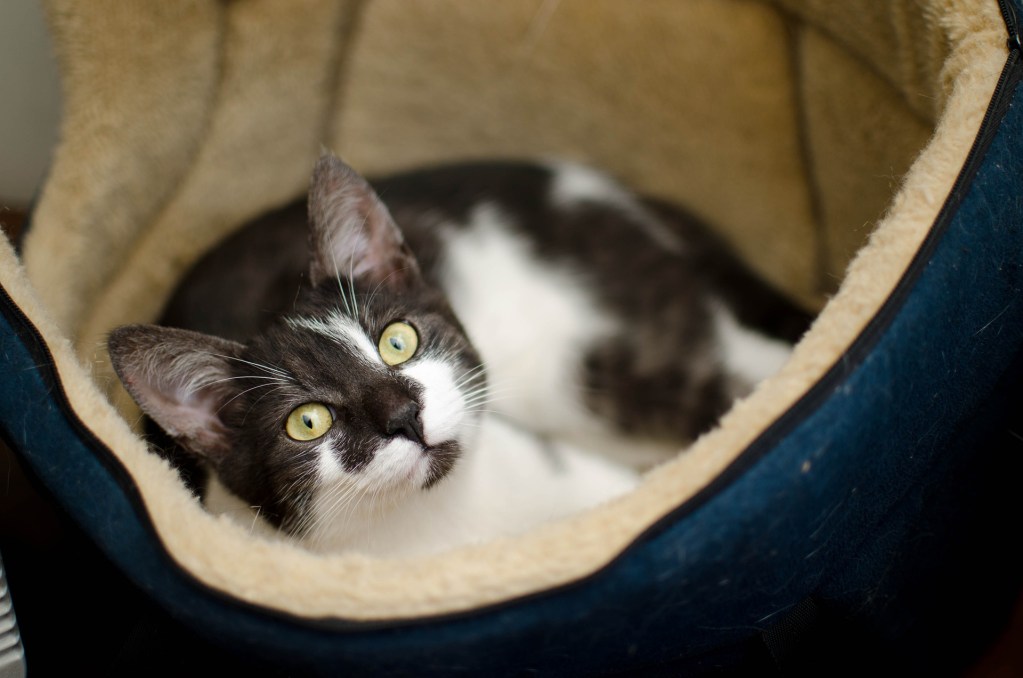Cats can naturally be quiet and independent, making it difficult to tell if they’re happy. If you have a new cat at home or have recently introduced a new pet, you might be worrying about how happy your cat really is. The good news is that cats actually send out all sorts of signs to let you know if they’re happy — or if they’re not so content. All you have to do is be able to recognize those signs. Knowing how to tell if your cat is happy can help you better understand how he feels, and you might even be able to tell if your cat is having a physical issue that might need some vet attention. Be sure to look for these 10 signs your cat is happy.
Frequent purring
A happy cat may purr frequently, particularly when he’s spending time with you or eating a great meal. Keep in mind that purring can also be a sign of stress, so it’s important to read the overall situation to determine whether the purring is happy or stressed.

Seeking out your attention
A happy cat may actively seek out your attention because he enjoys interacting with you. If your cat is content, he may sleep beside you on the couch, follow you from room to room, or even join you in bed at night.
Spending time in the same room with you
If you have a happy, social cat, he will usually want to spend time in the same room with you. This doesn’t mean that he has to be right up next to you, but a cat who hangs out in the same rooms where you spend the most time is showing that he likes being around you.
A healthy appetite
Happy cats tend to have healthy appetites. If a cat is stressed or upset, his appetite often suffers, but a kitty who eats up his meals right away is often a happy cat. (Highly stressed cats may also gorge on food, so be sure to look for other signs that your cat is happy to confirm that his good appetite is just because he’s healthy and content.)
Slow blinking
Some cats show affection and contentment by blinking at you slowly. Your cat might blink two or three times in a row, demonstrating that he’s happy and relaxed. You can return the compliment by slowly blinking back at him.
Playful nature
If your cat is comfortable, healthy, and happy, he’s more likely to be playful, too. A cat who’s often playing with his toys, or who is always ready to join in a game of laser chase, is probably a pretty happy cat. Watch your cat for signs that he’s enthusiastic about playtime. Your cat’s fun-loving nature can indicate that he’s feeling good and that he’s also comfortable enough in his surroundings to cut loose and truly play.
Deep sleep
Cats who are happy in their homes are more likely to let themselves sleep deeply and comfortably, even when you’re around. Cats are vulnerable when they sleep, so they naturally tend to seek out quiet spaces where they’re safer before taking a nap. If your cat happily sleeps on the couch or in another central place in the house, he’s showing that he’s confident and content in his surroundings.
You can watch as your cat snoozes to look for additional signs that indicate his comfort level. A happy, comfy cat may stretch out, splay himself on the furniture, and even lie on his back and expose his belly — a vulnerable position. He may continue to sleep even as you pass by him, demonstrating how safe he feels.

Happy body posture
A cat who’s happy and confident will show it in his body. Look for easygoing, contented body language like a raised yet relaxed tail, a head up with alert eyes, and a sweeping, steady walk. Your cat might even look like he’s strutting a little bit. It’s just his confidence and happiness shining through.
Bonds with other cats
A happy cat who’s well settled will have good relationships with the other cats in your home. Watch to see if your cat plays with, sleeps with, or even grooms the other cats. These can all be positive signs that your kitty is happy and gets along well with his other buddies.
Rubbing against you
Cats spread their scent to others by rubbing against them, and if your cat loves you and wants to show that you are his, he’ll rub against you, too. Look for times when your cat rubs his head against your legs or hands, and understand that he’s giving you a big compliment when he does this.
These 10 signs your cat is happy can help you better understand how your cat is feeling at any time. Knowing how to recognize these signs is an important step in caring for your cat. If these signs change, your cat may be indicating that something has gone wrong. He could be feeling sick, struggling to cope with a recent major household change, or otherwise bothered by something that’s occurred, like your having recently returned to work. Recognizing when these signs of happiness change means you can quickly identify an issue and take steps to try to determine what’s bothering your cat. As a result, you’ll be better able to keep your cat healthy and happy.


